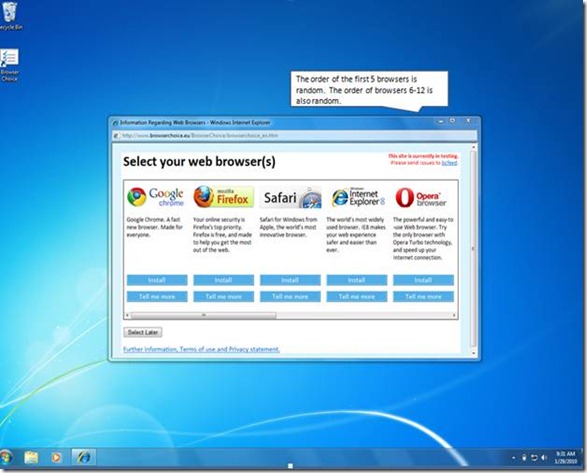
It's here: Microsoft's "browser ballot" screen, the menu that gives you the choice of a dozen different web browsers, is on PCs and giving Flock more publicity than it could ever possibly deserve.
It's fantastic news for Netscape, of course, and we're sure they'll be cracking open the champagne now that Microsoft is being publicly punished for using all its might to crush the rival browser firm. Or at least they would be if Netscape hadn't gone to the wall about a thousand years ago.
Technology years are like dog years, and the gap between Microsoft hammering Netscape into the ground and Microsoft getting punished for it is roughly the same as the gap between the discovery of the wheel and the invention of the Aston Martin DB9.
At its peak, Microsoft's browser had around 98% of the browser market; now, it's down to just over 60%. That's for all the versions of Internet Explorer combined: if you look at single browser editions, Firefox is more popular than Internet Explorer.
What we've got, then, isn't a case of locking the stable door after the horse has bolted: it's a case of locking the stable door after the horse has evolved opposable thumbs, learnt to drive cars and driven through the stable in a Challenger tank. It's far too late for Netscape and Microsoft's browser share will never recapture its near-total control of the internet.
It's not going to make much difference to the minority browsers, either. Irrespective of their strengths, Maxthon, FlashPeak Slimbrowser and Greenbrowser aren't going to suddenly get hundreds of millions of new users.
The browser likely to get the most benefit is Chrome, which is also benefiting from a hugely expensive billboard ad campaign and the odd bit of promo on the Google home page. If people choose to switch from Internet Explorer, which is more likely: that they'll go for a browser they've never heard of that's big in China, or that they'll go with Google?
Sign up for breaking news, reviews, opinion, top tech deals, and more.
In effect, the EU is punishing anti-competitive behaviour by forcing Microsoft to promote Google - the same Google that, er, it's investigating over claims of anti-competitive behaviour. That makes sense, doesn't it?
Here's a prediction. A few years from now, Chrome will have ten times the market share it has now - and amid concerns that Google is far too powerful, the EU will force it to promote another firm in its search results and in its Chrome OS. And that firm will be owned by the Devil.

Contributor
Writer, broadcaster, musician and kitchen gadget obsessive Carrie Marshall has been writing about tech since 1998, contributing sage advice and odd opinions to all kinds of magazines and websites as well as writing more than twenty books. Her latest, a love letter to music titled Small Town Joy, is on sale now. She is the singer in spectacularly obscure Glaswegian rock band Unquiet Mind.